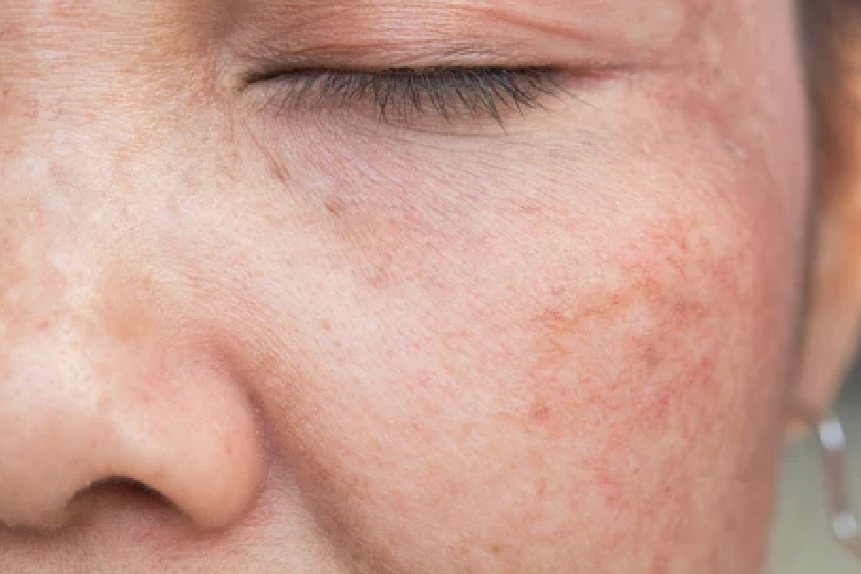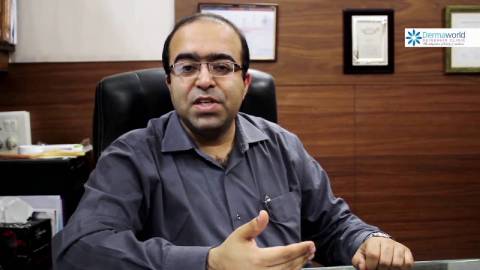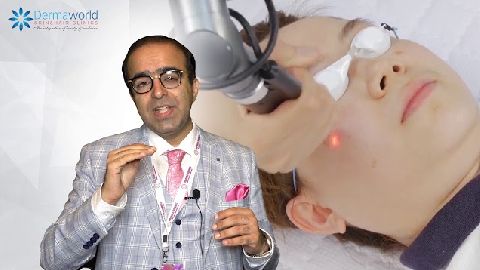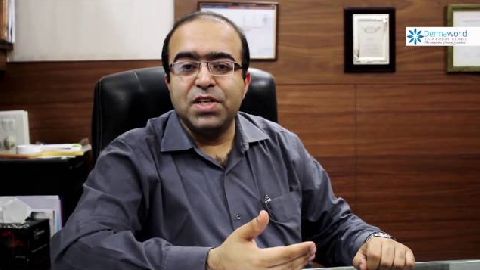
Factors responsible for hyperpigmentation
- Hormonal changes in the body.
- Pregnancy.
- Birth control pills.
- Excessive sun exposure.
- Steroids intake.
- Chemotherapy drugs
- Insulin resistance.
- Endocrine disease (Addison’s disease).
- Trauma and injury.
- Chickenpox.
Best Skin Pigmentation Treatment Clinic in Delhi
Human skin contains the cells known as melanocytes, explains Dr. Rohit Batra Best Skin Pigmentation Treatment Doctor in Delhi, India at DermaWorld. which are responsible for producing the pigment found in the skin called melanin, with the help of the process of melanogenesis. Too much melanin production can lead to hyperpigmented skin. It is a harmless skin condition in which the skin patches become darker in color as compared to the normal surrounding skin. Melasma, age, or liver spots are some common form of hyperpigmentation. These small, dark patches are usually found on the face and hands, and mainly in the areas exposed to the sun.
Hyperpigmentation, because of excess melanin production makes spots or skin patches appear darker than the surrounding areas. It can affect people of all skin types, and other types of hyperpigmentation can occur due to skin inflammation, cuts, acne lupus, and burns.
Melasma is also similar in appearance with age spots and is formed as a result of hormonal imbalance.
Freckles are small brown spots, and they can appear in any part of the body but mostly on the face and arms.
These freckles, age spots, and pigmentation in the skin become darker when the skin is exposed to the sun. This happens because melanin absorbs the ultraviolet rays emitted by the sun in order to protect the skin from overexposure.
Ways that help to get rid of hyperpigmentation
Pigmentation can be a recurring problem, hence daily skincare routine plays a pivotal role. Our skin specialists at Dermaworld Skin Clinics recommend following these preventive measures:
- Protect the skin from sun exposure and applying sunscreen with an SPF of 30 or more. This helps the skin from hyperpigmentation and becoming darker.
- After an injury, one must avoid picking scabs, spots, and acne, to prevent hyperpigmentation.
- Various topical creams that contain kojic acid, vitamin C, retinoids, and corticosteroids.
Book An Appointment
ALL CLINICS CLOSED ON SUNDAY
Cosmetic procedures
Various cosmetic procedures can also help to lighten areas of the skin and reduce the appearance of hyperpigmentation. These cosmetic procedures are available at Dermaworld Skin Clinics in Delhi and have been proven effective in treating different kinds of pigmentation issues.
- Laser Toning Treatment
Also popular as laser toning, it works on almost all kinds of pigmentation such as sun spots, freckles, age spots, and even flat birthmarks. The laser beam is targeted on the specific area which breaks down the dark pigment. This does not affect the surrounding skin. Multiple sessions will be required depending upon the type of pigmentation and the laser being used. This treatment can help to eliminate pigmentation without scarring. The laser treatment promotes collagen growth, so one can expect long lasting results.
- Chemical Peels
Chemical peels have been a preferred method of treatment for mild to moderate pigmentation problems. At Dermaworld Skin Clinic, our skin experts recommend using glycolic acid peel, salicylic acid peel, and trichloroacetic peel (TCA) depending on the requirement of a particular patient. The Glycolic acid peel is an alpha hydroxy acid which works well for superficial pigmentation. On the other hand, Salicylic acid peel is effective in treating pigmentation caused by sun damage, hormonal issues and post-inflammatory hyperpigmentation. The TCA peel is used when the pigmentation is deep rooted as it penetrates deeper than any other peel.
All of these peels work by shedding or peeling the dead and unwanted skin layer. Therefore, apart from pigmentation issues, these peels help to get an even toned skin and a smooth texture. - Microdermabrasion
This treatment is effective in treating mild pigmentation. It applies the technique of skin exfoliation by removing the top most layer of the skin i.e. epidermis. This triggers the body's healing mechanism and therefore, promotes skin renewal by speeding up the cell turnover. The new skin appears to be brighter and more smooth. The results can be seen instantly and it keeps improving for up to a few weeks. - Dermabrasion
One can get quicker results with dermabrasion as compared to microdermabrasion. Generally, a numbing cream is applied before the procedure to minimise the discomfort. During the procedure, A handheld tool with wire brush is moved on to the target skin area with a gentle pressure. After the procedure, the skin will be red and swollen. Eventually, the skin on the treated area will shed in the form of scab or crust. The healed skin will be clear and bright. However, it is crucial to follow the doctor’s instructions for fast healing and optimum results. - Intense Pulsed Light
Also known as IPL therapy, photofacial or photorejuvenation; this is effective in treating sun spots, age spots, redness (rosacea), varicose veins and broken capillaries. This helps in improving skin tone and texture. This is a preferred treatment method for people with lighter skin tones. - Cryotherapy
Similar to IPL, this method is suitable for light skin tones only. It involves using liquid nitrogen that freezes the skin tissue. After a couple of days, a scab is formed and once it’s shed the new and clear skin is revealed.
Our dermatologists at Dermaworld Skin Clinics can help you to determine the cause of hyperpigmentation. Symptoms, skin test, and wood light can help to determine the cause of hyperpigmentation. A dermatologist can help you to achieve a beautiful, radiant, and younger looking skin. Get regular skin checks to maintain your skin health.
Contact DermaWorld Skin & Hair Clinic, the best hyperpigmentation treatment clinic in Delhi, India for hyperpigmentation / Skin Pigmentation concerns at an affordable cost!
Frequently Asked Questions
The laser treatment is effective in lightening the noticeable signs of pigmentation. The cost of laser treatment for pigmentation varies from person to person.
It depends on various factors like:
- Depth and severity of scars to be treated.
- Number of laser sessions required.
- Type of laser technology used to treat the concern.
- Size of the area to be treated.
- Location of the clinic.
Laser toning is one of the best non-surgical ways to manage the pigmentation problem. In this treatment, laser light is used to target the deeper layers of the skin to lighten the dark areas of pigmented spots so that an individual can have an even tone, impeccable and youthful skin. Benefits of laser toning include:
- It helps to restore the ability of the skin to heal naturally.
- It is a one-stop solution for all problems such as acne scarring, fine lines, wrinkles, blackheads, and more.
- There is no downtime associated with laser toning treatment, so an individual can return to their daily work just after the treatment.
- The treatment stimulates collagen production and improves the overall texture and appearance of the skin. Collagen is the main building protein of the skin that is responsible for giving elasticity, glow, and strength to the skin.
Hyperpigmentation is a cosmetic concern in which small or larger patches of the skin become dark in color compared to the rest skin color. The most common cause of hyperpigmentation is excessive production of melanin, the pigment that is responsible for giving color to skin and hair. Other causes of hyperpigmentation on the face include:
- Hormonal changes.
- Certain medications.
- Excessive sun exposure.
- Skin irritation or injury.
An individual can prevent themselves from the occurrence of hyperpigmentation or prevent it from spreading, by following these cautionary measures :
- Avoid direct exposure to sun rays: Wear full clothing and apply a sunscreen of SPF 30 or more to protect the skin from getting darker.
- Avoid picking up the skin: Picking may irritate the skin and cause excessive production of melanin in the skin.
- Consult a doctor: If a person notices persistent acne or acne is getting worse day by day, then they should consult a dermatologist as severe acne can leave life long scars on the skin.
- Skin hydration: Keep the skin moisturized as it will boost cell turnover and avoid chances of occurrence of hyperpigmentation.
Usually, hyperpigmentation is a cosmetic issue that can make an individual feel embarrassed and self-conscious about their appearance. Some of the best cosmetic procedures that help to lighten the pigmented area include:
- Cryotherapy.
- Chemical Peels.
- Dermabrasion.
- Microdermabrasion.
- Intense Pulsed Light.
- Laser Toning Treatment.
When it comes to hyperpigmentation, the primary approach should be consultation with a dermatologist as it could be a sign of any underlying health condition. Consulting with a dermatologist will help to analyze the root cause of hyperpigmentation, and get advise for the right way to manage the pigmented spots so that one can have an even-toned radiant skin.




